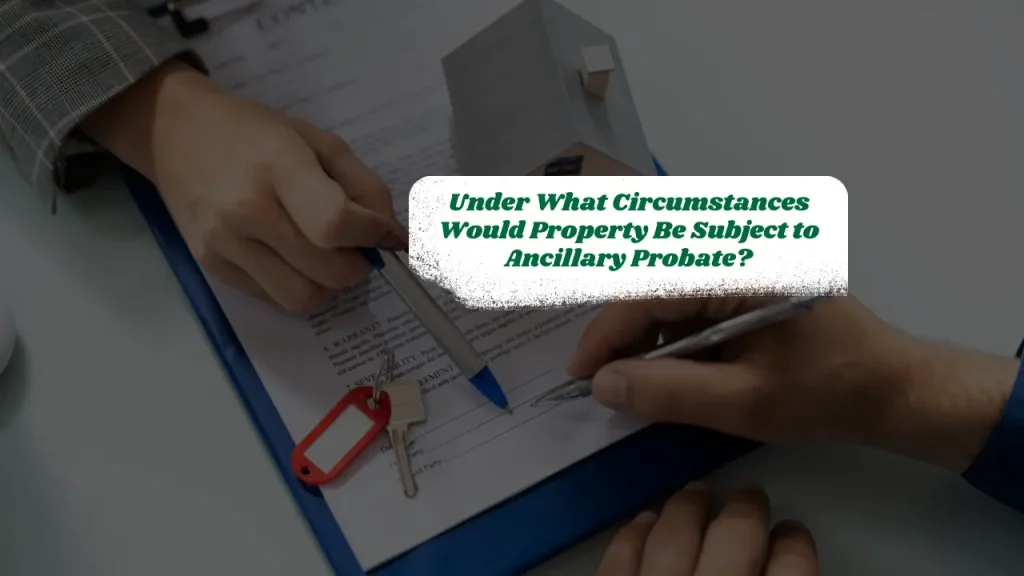Under What Circumstances Would Property Be Subject to Ancillary Probate?
When managing an estate, few things are as frustrating as discovering that a loved one’s property requires ancillary probate—a secondary legal process that adds time, cost, and complexity. But what triggers this requirement, and how can you avoid it? Let’s break down the key scenarios where ancillary probate comes into play and what you need to know in 2025.
Table of Contents
What Is Ancillary Probate?
Ancillary probate is a legal process required when a deceased person (the decedent) owned property in a state outside their primary residence. For example:
- A Florida resident owns a vacation home in Arizona.
- A New York citizen holds a rental property in Georgia.
The primary probate occurs in the decedent’s home state (their domicile), while ancillary probate handles the out-of-state assets.
4 Common Circumstances Requiring Ancillary Probate
1. Out-of-State Real Estate
The #1 trigger for ancillary probate is owning real property (homes, land, rental units) in another state.
Example: A Texas resident with a cabin in Colorado must file ancillary probate in Colorado to transfer ownership.
Why? Real estate is governed by the laws of the state where it’s located.
2. Vehicles or Boats Registered Elsewhere
Cars, boats, or planes titled in another state may require ancillary probate if not jointly owned or covered by a TOD (Transfer-on-Death) designation.
Example: A Michigan resident’s vintage car stored in Nevada.
Related article for you:
How Much Does a Probate Judge Make? 2025 Salary Guide

3. Business Interests in Multiple States
Ownership stakes in LLCs, partnerships, or physical business locations (e.g., a second office in another state) can trigger ancillary filings.
4. Lack of Estate Planning Tools
If the decedent didn’t use a trust, joint ownership, or beneficiary deeds, even small properties may face ancillary probate.
When Is Ancillary Probate Not Required?
- Assets with designated beneficiaries (e.g., life insurance, retirement accounts).
- Property held in a living trust.
- Jointly owned property with rights of survivorship (e.g., spouses co-owning a home).
The Hidden Costs of Ancillary Probate
- Double the Work: Separate court filings, notices, and executor appointments in each state.
- Delays: Ancillary probate can add 6–12 months to estate settlement.
- Legal Fees: Hiring attorneys in multiple states may cost $3,000–$10,000+ extra.
- Conflict Risks: Heirs in different states might challenge asset distribution.
How to Avoid Ancillary Probate?
1. Use a Revocable Living Trust
Transfer out-of-state property into the trust. The trust owns the assets, bypassing probate entirely.
2. Joint Ownership with Rights of Survivorship
Co-own property with a spouse or heir so it transfers automatically.
3. Transfer-on-Death (TOD) Deeds
Available in 30+ states, TOD deeds let you name a beneficiary for real estate.
4. State-Specific Tools
- Lady Bird Deeds (Florida, Texas, Michigan): Retain control during life but transfer property at death.
- Community Property Agreements (WA, CA, TX): Automatically transfer assets to a surviving spouse.
State Spotlight, Where Ancillary Probate Hits Hardest
- Florida: Non-residents with vacation homes often face ancillary probate due to strict homestead laws.
- California: High property values mean hefty court fees for out-of-state heirs.
- Texas: Rural land inherited by non-residents requires ancillary filings.
FAQs
Does a will prevent ancillary probate?
No. A will still must go through probate in each state where property is located.
Can I sell out-of-state property before ancillary probate?
Usually not. The court must authorize the executor to sell it.
What if the decedent owned property in multiple states?
You’ll need ancillary probate in each state with property.
Key Takeaway
Ancillary probate is typically required when the deceased owned real estate or titled assets in a state outside their primary residence. Proactive estate planning—like using trusts or TOD deeds—can sidestep this headache.
If you’re already facing ancillary probate, consult an estate planning attorney licensed in the property’s state to streamline the process.
Need Help?
Check your state’s probate court website (e.g., Florida Courts) or connect with a local estate planning attorney. A little planning today can save your heirs a mountain of paperwork tomorrow.
About the Author

Sarah Klein, JD, is an experienced estate planning attorney who has helped clients with wills, trusts, powers of attorney, and probate matters. At All About Lawyer, she simplifies complex estate laws so families can protect their assets, plan ahead, and avoid legal headaches during life’s most sensitive moments.
Read more about Sarah
